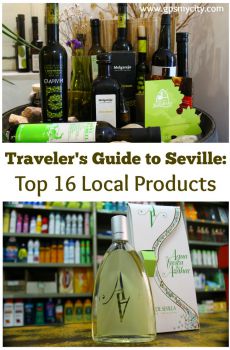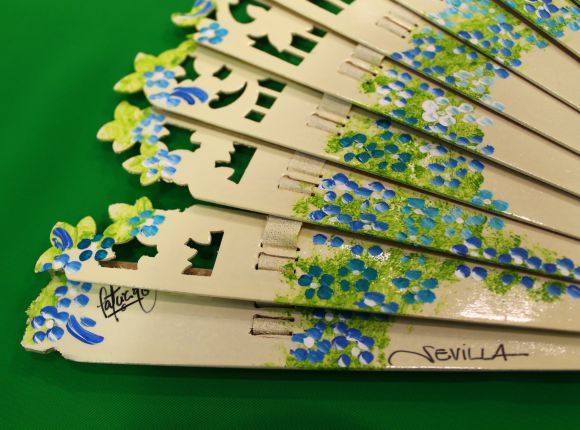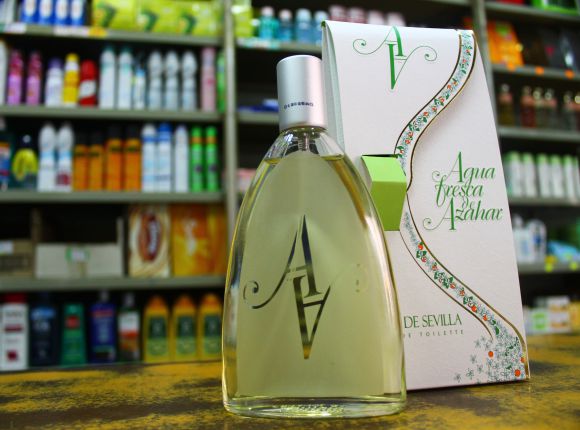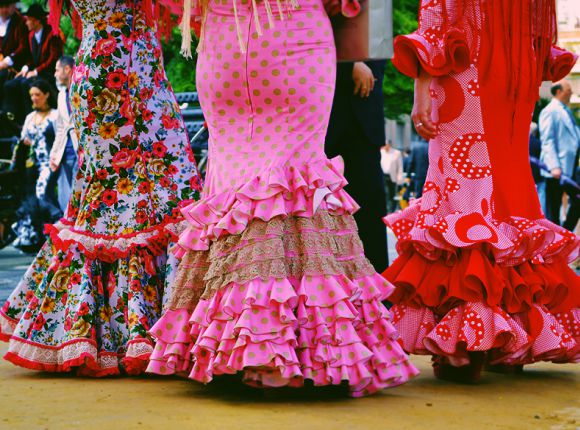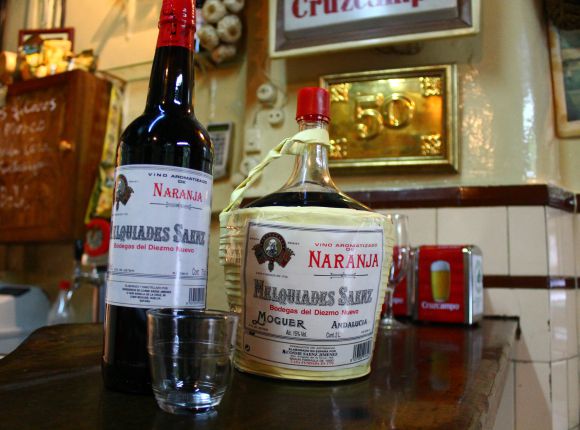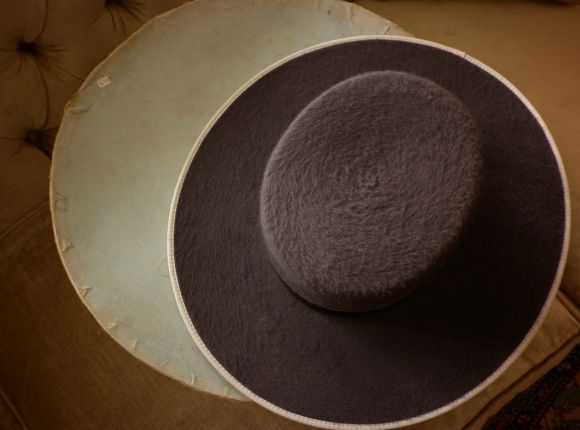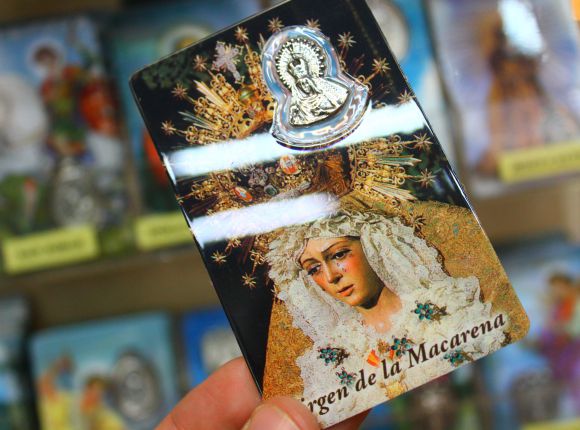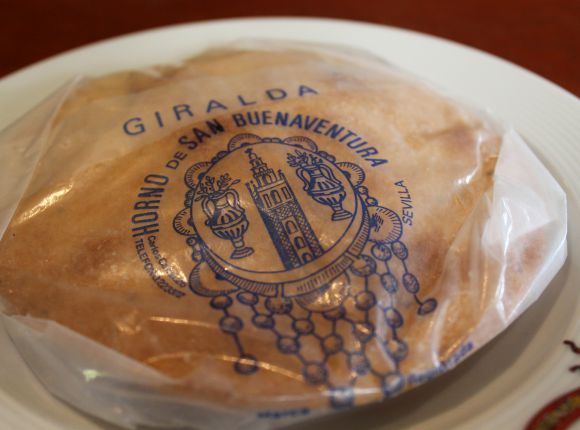1. Cartuja Ceramics

Seville’s Cartuja Monastery, now a world-class modern art museum, still stands witness to the large kilns used to fire the hand-crafted ceramics that emblazons the city. You’d be hard-pressed to find a traditional eatery in the city that didn’t have the iconic celosía tiles lining the perimeter of the establishment, and most Spanish homes have ceramic pieces decorating balconies, walls or even bathrooms. Taking home handcrafted ceramic makes a delicate yet gorgeous gift, and its practicality is appreciated on both sides of the Atlantic. You can pick up anything, from a magnet to a set of bowls in blue, green, yellow and red hues, or even find a tile of the city’s patron saint, San Fernando.
While the Cartuja monastery gave the name to this time of handicraft, tile is no longer produced there. Instead, the small shops that cluster C/San Jorge and C/Antillano Campos produce, paint and fire their products in-house. Most shops offer the option of designing your own wares, but all will neatly pack up your purchase to ensure they don’t break on the trip back home.
Price: €3 - €100 or more
Where to find it:
Ceramicá Santa Ana
Calle San Jorge, 31, Seville, Spain
+34 954 33 39 90 ceramicasantaana.co
Monday – Saturday 10:30am – 8pm; Sunday 10:30am – 6pm
Offline reading and travel directions:
With GPSmyCity App you can read this article offline on your mobile device, use the embedded offline city map and GPS navigation, as well as create a self-guided walk to visit the venues featured in the article.
2. Olive Oil
Southern Spain produces more olive oil than any other region in the country, thanks to its dry climate and groves of trees; the produced here olive oil is of exceptional quality, winning many international prizes. Southern Spanish cuisine centers around aceite de oliva, so packing away a bottle or two to take home will send you back to sunny afternoons in Santa Cruz, nibbling on fried fish or creamy salmorejo.
Price: €8-19 per ½ litre
Where to find it:
The Olive Oil Workshop
Address: 41001 Seville, Spain
Phone Number: +(34)687224928
Buy It on Amazon:
Offline reading and travel directions:
With GPSmyCity App you can read this article offline on your mobile device, use the embedded offline city map and GPS navigation, as well as create a self-guided walk to visit the venues featured in the article.
3. Convent Sweets
The historic city center is dotted with convents where the nuns pass their time making sweets and peddling them out of turnstiles in the foyer. From honeys and jams to cookies, the nuns provided sevillanos with their sugar rush. Enter into any of the small doors next to the convent, and a cloistered nun – hidden from view – will ask your order. Tell them you’ve come without sin, and you’ll be awarded with something sinful – pestiños, yemas San Leandro and other goodies.
The convent sweets do come in boxes, however just basic cardboard boxes and do require some care if you aim to take them home with you. During the first weekend in December, there’s also a market in the Patio de las Banderas of the Alcázar palace which showcases the city’s most delicious treats. Most of the cloistered nunneries in the city have treats for sale, but listed below are some of the most popular.
Price: €5 for a box of almond sweets and up to €16 for Yemas de San Leandro, an egg yolk pastry.
Where to find it:
Convento San Leandro (famous for Yemas de San Leandro, egg yoke treats)
Address: Plaza de San Ildefonso, Seville, Spain
Convento Santa Inés
Dona María Coronel, 5, Seville, Spain
+34 954 223 145
Monday – Saturday 9am – 1pm and 5pm – 7pm
Offline reading and travel directions:
With GPSmyCity App you can read this article offline on your mobile device, use the embedded offline city map and GPS navigation, as well as create a self-guided walk to visit the venues featured in the article.
4. Hand-Painted Fans

When the midday heat becomes unbearable, Sevillian women sport hand-painted fans. During Spain’s Golden Age, fans came to have a language of their own in courtship, but today you can find an abánico in nearly every size and color, just to complement a look. Whether you’re a bride searching for a lace fan or you simply want something to remember your days in Seville by, fans make light and practical gifts, and seem almost personal due to the plethora of options in their color, style and cut. Most come with a matching case to keep it safe from wear and tear during the hot summer months.
Calle Sierpes, one of the major shopping thoroughfares of the old city, has world-class establishments with over a century of experience, and all the fans painted in-house. Additionally, many sell brooches and shawls that are handcrafted and almost disguise your touring gear! If you’re looking for something of a lesser quality to give as a fun gift for friends and family, look no further than Plaza de España, where you can score three for €10.
Price: €2.50-€5,000
Where to find it:
The people at Abanicos de Sevilla have four stores with similar merchandise and prices.
Castañuelas Zadi
Calle Sierpes, 48, Seville, Spain
+34 954 22 85 91
Abanicos Díaz
Calle Sierpes, 71, Seville, Spain
+34 954 22 81 02 abanicosdiaz.com
Monday – Friday 10am – 8:30pm; Saturday 10am – 2pm
Buy It on Amazon:
5. Orange Blossom Perfume
When the bitter Seville oranges are plucked from the thousands of trees around the city, the orange blossoms spread their intoxicating scent all over the area. Good thing is, you can have it bottled up and take home the fragrance by purchasing orange blossom perfume, called Agua de Azahar. While this product is often used in baking, even the small white flower is pressed and mixed with alcohol to leave a smell that can be likened to fresh laundry with a sprig of citrus, or just an afternoon roaming the streets of Seville during the springtime.
Price: 14€ a bottle
Where to find it:
Droguería del Arenal
C/García de Vinuesa, 43 Portal A, Seville, Spain
+34 954 223 729
Monday – Friday 9am – 2pm and 4:30pm – 9pm
6. Mantillas and Mantones de Encaje
Gorgeous, black, hand-embroidered shawls are a staple of Holy Week fashion and April fair fashion. Seemingly out of the last century, both can be made of either silk or rayon, handmade or by machine. Regardless, both add a touch of elegance to any outfit – just ask any Sevillian woman who wears one to a bullfight or wedding, or even with her flamenco dress! The size and color options are seemingly endless, and paired with a plastic or tortoise shell comb, are a beautiful gift option for anyone on your list.
Price:
Mantones: €26 - €1000
Mantillas: €44 - €1000
Where to find it:
Artesanía Textil
C/García de Vinuesa, 33, Seville, Spain
+34 954 215 088 www.artesania-textil.com
Monday – Thursday 9:30am - 8pm; Saturday 10am - 2pm
Buy It on Amazon:
7. Sherry Wine
Nearby Jeréz de la Frontera and El Puerto de Santa María produce the crisp sherry wine and mass export it to Seville. It’s not unusual to see a sevillano sipping a small glass before lunch, and fino is the drink of choice at the springtime fairs, often mixed with 7-Up. Made from white grapes grown in a small, triangular denomination near the Atlantic Coast (between the cities of Jerez de la Frontera, El Puerto de Santa Maria and Sanlúcar de Barrameda), this under-appreciated wine comes in dozens of varieties, from dry to sweet. Paired with olives or cheese, the jérez you picked up in Seville will bring you lasting memories of your trip to Seville, or even add a little more to your dishes.
Price: €5-€60
Where to find it:
Supermercado El Corte Inglés
Plaza del Duque de la Victoria, 8, S1, Sevilla, Spain
+34 954 59 70 00
Monday-Saturday 10am-10pm
8. Anisette
The national drink of the Mediterranean could easily be anisette liquor, a clear drink consumed at nearly any time of day in Seville. Made through the process of distilling anise seeds, the taste is of licorice and there is no shortage of types – from aguardiente to Turkish raki. While most supermarkets will carry the famous brands, having an anise with your afternoon snack is the sevillano way. Nearly every bar in the city has a bottle stashed under the bar, and all households tend to use it as an aperitif or an after dinner drink. If you’re brave, you could head to Cazalla de la Sierra, the whitewashed city north of Seville where a type of anisette infused with cherries, called Miura, is mass produced, and where locals are happy to buy you a round or two.
Price: €3-15 per bottle
Where to find it:
Supermercados el Corte Inglés (basement)
Plaza del Duque de la Victoria, 8, Seville, Spain
+34 954 59 70 00 elcorteingles.es
www.elcorteingles.es
Monday-Saturday 10am-10pm
9. Flamenco Dresses and Accessories

Colorful, polka-dotted and form-fitting, a traje de gitana, or flamenco dress, is one of the most authentic gift options in Seville. As the cradle of flamenco, the city plays host to some of the best flamenco fashion designers in Spain, like Vicky Martín Berrocal, Loli Vera and Luchi Cabrera, who draw their inspiration from the gypsies of centuries past and the cobblestone alleyways of the old city. Expect low necklines and plenty of ruffles, and bear in mind than many can be tailored in-house to fit your measurements.
Complete the look by adding accessories, known as complementos. The rule of thumb is the bigger-the better, so don’t be afraid to purchase something that seems a little exaggerated. The most common are cloth flowers, combs and earrings, but women spend upwards of €100 for their unique look, while adding shawls and other accessories. While many high-quality shops can be found all over the city, Calle Francos, parallel to Avenida de la Constitución, is lined with flamenco stores with great deals, especially after the springtime fairs have ended. Some will generously add the shawl and flower for no charge, too.
Price:
Dress: from €99 to €500+
Shoes: €10–€60
Accessories: €2–€50+
Shawls: €20+
Where to find it:
Isabel Mediavilla
Calle Francos, 34, Seville, Spain
+34 954 564 722 www.isabelmediavilla.com
Monday – Friday 10am – 2pm and 5pm – 8:30pm
Buy It on Amazon:
10. Orange Wine
Vino de naranja, or orange wine, is a specialty of Andalusia. Take a stroll down the streets of Seville and you'll understand why: orange trees line the streets and fill the city with colour, citrus aroma, not to mention the constant threat of injury from slipping on a squashed fruit. Seville’s orange trees give jam to England, and a bittersweet vino de naranja to the rest of the world. The orange wines are white wines in essence, but are made more like reds, with prolonged extraction of crushed grape skins and seeds.
According to a legend, once upon a time, a Queen of Seville, homesick for her native Alps, threatened to leave the King unless he made it snow after a long hot summer. Out of desperation, the King ordered to plant orange trees throughout the city; in spring the trees blossomed and covered the area with flowers, whose white petals created the illusion of snow. Not quite the Alps, but still... It worked.
Where to find it:
Taberna Alvaro Peregil
Calle Mateos Gago, 20, Seville, Spain
Daily 1pm-12:30am
11. Ironworks
The streets of Sevilla boast lovely ironworks wherever you look - lamps, railings and even manhole covers; iron to Seville is what neon is to Las Vegas. The ornate pieces in the form of hooks, drawer pulls, kings and even statuets make wonderful, lasting souvenirs. The Spaniards buy all of their hardware needs at stores called ferreterías, and the selection of Ferretería Puerta Carmona has a reputation for being the biggest and best. In the small, cramped space, men pull out drawers filled with nails and hooks, and the walls have ironworks – often called reja – mounted all the way up to the ceiling. Ask to see the other warehouses, which showcase beautiful pieces that they’re willing to send back home for you.
Price: varies depending on product. A brass knocker is €17 and up, for example.
Where to find it:
Ferretería Puerta Carmona
Calle San Esteban, 39 Seville, Spain
+34 954 419 457
Monday – Friday 9am – 1:30pm and 5:30pm – 8:00pm; Saturdays 9am – 12:30pm
12. Sombreros Cordobeses
Cordobese style hats are fashionable during the springtime fairs around Southern Spain, and their wide brims keep the sun away from your face. There is none more famous than the one crafted by Antonio García, which has been the leading house of hats in Seville since 1847. Little has changed about the construction of these handmade hats in the last 150 years, and the variety can’t be beaten by any other establishment. Taking into account size, purpose and material, the warehouse has a cordobés for every taste. Antonio García also has monteras - the hat bullfighters sport, products for horses, caps and even top hats for purchase, all sealed up in a powder blue box for safekeeping when you arrive home.
Price: €40 - €150
Where to find it:
Antonio Garcia
C/ Alcaicería, 25, Seville, Spain
+34 954 222 320 www.sombrerosgarcia.com
Monday – Friday 10am – 2pm and 2:30pm – 8:30pm; Saturday 10:30am – 2pm
13. Old-World Bullfighting Posters
Seville is home to the beautiful Maestranza bullring, one of the oldest and most respected in Spain. Those who love Hemingway or the art of the capea, can’t leave Seville without picking up one of the posters, called carteles, which announce the summer line-up of bullfighters. Some retain creases from being folded or even dirt or a tear, making their authenticity as unquestionable as the fear a charging bull strikes in the heart of a matador. While the bullring sells reproductions, prices for posters are generally based on the age (the older, the costlier), and any famous torero that appears. Casa Felix, an age-old poster shop that sits in front of the sprawling cathedral, is a small shop that pays homage to the arts of bullfighting and flamenco. Here, you’ll find more than posters – pins, old tin advertisements and books are on sale, too.
Price: €5 - €100
Where to find it:
Póster Félix
Plaza del Cabildo, 7, Seville, Spain
+34 954 218 026
Monday – Tuesday 10am – 3pm and 5pm – 8pm; Saturday, Sunday 10am – 3pm; 5pm - 8pm
Buy It on Amazon:
14. Mantecados and Polverones
Seville’s crumbly Christmastime treats are made of pig lard and consumed in flavors ranging from lemon to cinnamon to almond. Though they’re enjoyed all across Spain, the origin of this cake is strictly Andalusian, and likely from the nearby town of Estepa. Vegetarians beware: the taste is pure sugar, but both contain pig parts. Paired with anise, it’s a perfect snack – and it’s claimed they don’t make you gain weight! Most supermarkets and pastry shops will stock them from mid-November to mid-January, and university students even sell them to finance their vacation getaways. Simply grab a pre-prepared box, or mix and match and have the contents weighed in the produce section.
Price: €3-€7 per kilo
Where to find it:
Supermercados el Corte Inglés (basement)
Plaza del Duque de la Victoria, 13, Seville, Spain
+34 954 59 70 00 elcorteingles.es
www.elcorteingles.es
Monday – Saturday 10am – 10pm
15. Religious Gifts

Holy Week is one of the most celebrated holidays of the year in Spain, and Seville’s fame is well-deserved. The streets fill with incense, three-foot long candles and the more than thirty penitent brotherhoods who parade their lifelike floats through the city center. You can take home a token of the city’s most passionate week, ranging from small to large, simple to ornate. Common gifts include rosaries, incense, figurines and robes. Or else, pick up a small image or pendant of the most famous saints – Seville’s Virgin Mary, La Virgen de los Reyes and Christ, El Jesús del Gran Poder (he’s also the oldest float still in use!) or San Fernando, the patron of the city.
Additionally, at many of the churches and chapels, you can pick up pins, key-chains and medallions of the famous processions and donate to the church’s upkeep fund. If you’ve ever danced the Macarena, you’ll know that the song was named after Seville’s famous Virgin of the same name, whose procession during the early dawn of Good Friday is among the most popular.
Price: varies, according to product, from €2.50 and up
Where to find it:
Juncia y Romero
C. Francos, 15, Casco Antiguo, 41004 Sevilla, Spain
+34 954 229 662 www.Junciayromero.com
Monday – Friday 10am – 1:30 and 5:15pm – 8pm; Saturday 10:30am – 1:30pm
Buy It on Amazon:
16. Tortas del Aceite
A lunchbox staple and afternoon snack favorite, tortas del aceite are simple cakes made of flour, sugar and salt that are fried in olive oil. Dipped in coffee or hot chocolate, the small cakes are crunchy and light, so it’s a good treat to break up a shopping day. Located on the main shopping street Calle Sierpes, you’ll find Confitería La Campana, one of Seville’s oldest and most respected pastry shops. The waiters, dressed in Old World uniforms, serve cakes and pastries on gorgeous china out of a wood-paneled shop. You can have a torta in their outdoor seating, standing up at the bar, or take some home for family and friends.
Price: €1.30 (about 30g)
Where to find it:
Confitería La Campana
C/Sierpes, 1-3, Seville, Spain
+34 954 223 570 www.confiterialacampana.com
Monday-Thursday 8am – 10pm; Friday-Saturday 8am-11pm
Buy It on Amazon:
Other Interesting Souvenirs from Spain
If traveling to Spain is not on your immediate agenda, or you simply can't afford an extra space in your luggage, fortunately, these days, you can find a wide selection of authentic and truly interesting Spanish souvenirs online. Presented here are some of the Spanish products sought by foreign visitors, now available online for your convenience.
1. Flamenco Music - What appears to some like an infusion of Arab culture into a European one, Flamenco music by now has become an inseparable part of the fiery Spanish tradition, closely associated with a classical guitar. Still, guitar is just one of the three major parts of Flamenco as an art form; the other two being song and dance. Originated in the southern regions of Spain, over the years, Flamenco has been influenced by many world cultures, such as Christian, Jewish, Gypsy, and later by Latin American and Cuban.






2. Flamenco Castanets - Wherever there's Spanish Flamenco to be heard, there's an unmistakably recognized sound of Flamenco castanets. Often played by singers or dancers alike, despite a popular belief, castanets are not commonly used in the flamenco dance, except for its two specific forms: zambra and siguiriyas. The actual name (castañuelas) derives from the diminutive form of castaña, which is the Spanish for chestnut, which they resemble. In Andalusia, they are commonly referred to as palillos (little sticks), and this is the name by which they are known in flamenco.



3. Gourmet Cheeses - Just as any other Mediterranean cuisine, Spanish cannot be imagined with gourmet cheeses. Their variety is rich and comprises cheeses made from both cow's and goat's milk, boasting delightful flavors (mild, sweet, fruity, etc.), colors (from creamy white to rich purple, if cured in red wine), various degrees of saltiness, scents and texture (soft, medium, or hard). Ideal corporate or holiday gift for someone special. Best served with fresh fruits and Spanish red wine.

4. Jamón Iberico (Spanish Cured Ham) - Other than gourmet cheeses, no Spanish tapas plate can be imagined without a thin, see-through slice of jamon (cured ham), of which of Jamón Iberico is the best, made of both hind leg and front shoulder (paleta ibérico) of a special breed of pig indigenous to Spain. Quality jamon is recognized by a rich ruby color with beautiful marbling, abundance of flavor, and rich, silky, and smooth texture. Jamón Ibérico is the crown jewel of Spanish cuisine.





5. Spanish Saffron - Saffron, or azafrán in Spanish, is an essential ingredient of paella, and ultimately makes any Spanish dish taste more authentic. Spanish Saffron is also renowned for its medicinal properties, working as an antidepressant (relieving from mental stress) and helping to improve eyesight, weak memory, blood pressure and retention of power. Saffron is commonly used as an added flavor to a number of seafood dishes, such as bouillabaisses & paella, rice, as well as tea.



6. Bota (Leather Wine Bottle) -A real bota wineskin from Spain is a beautiful thing, handmade following the lessons handed down over centuries. This bota can carry wine, water or any other refreshing drink wherever you go – be it on a bike ride, a picnic, or a hike through the forest. Share a drink with your friends and add the romance of old Spain to your next gathering.

7.Traditional Turrón -Turrón (or Torrone) is a traditional Spanish sweet made of honey, sugar, egg white, and roasted almonds (around 60% of the content). This smooth nougat confection that can enjoyed at any festive occasion as a healthy snack or fine dessert. A piece of timeless Christmas tradition in Spain not to be missed!


8. Handmade Espardenyes -Inspired by the hot Mediterranean climate, classic "Espardenya" - genuine classic flat Spanish espadrille - are the lightweight shoes made of natural jute rope, premium leathers, suedes and woven cloth. The term “Espadrilles” originates from the early esparto material from which the original espadrilles where made. Over the years, this versatile everyday footwear – the tradition of making of which has been passed down generations from mothers to daughters – has inspired numerous artists, celebrities and travelers worldwide.


